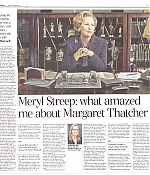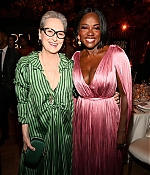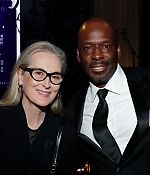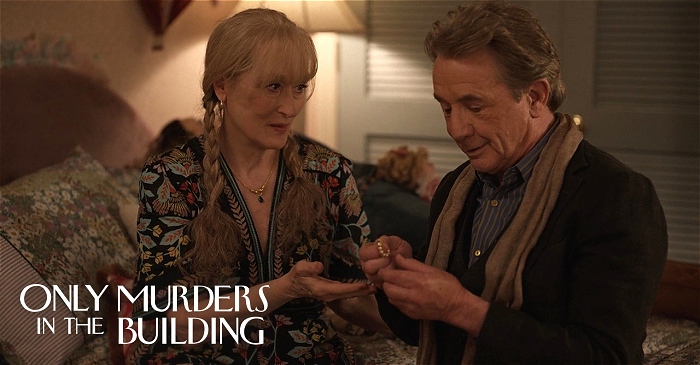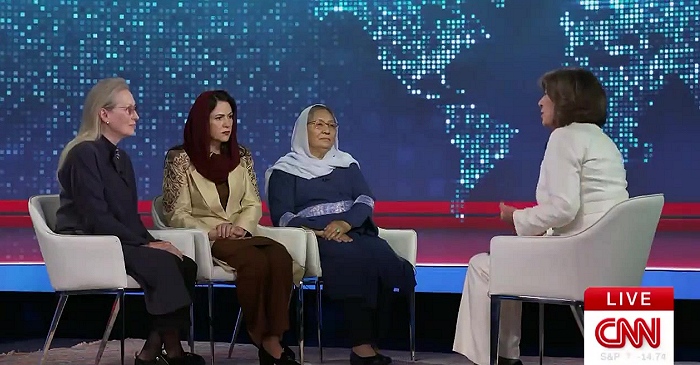
|
Meryl Streep: Meryl Streep: what amazed me about Margaret Thatcher
The Telegraph ·
December 08, 2011
· Written by John Hiscock
|
‘Am I an Iron Lady? No, I’m an ironing lady.” Meryl Streep is joking, but there are certain traits she believes she shares with the younger Margaret Thatcher, whom she portrays so brilliantly in the new film The Iron Lady. “I guess I’m as passionate about my work as she was, and, like her, I don’t want what I’m trying to do to be misconstrued,” she says. “But I was not thrilled with her policies or her politics because my friends and I were all playing for the other team.” Consequently, she had to think long and hard when Phyllida Lloyd, who had directed her in Mamma Mia!, came to her with the script for The Iron Lady. Also, she felt sure there would be grumbles about an American actress being cast in a quintessentially British role when England has so many accomplished actresses. “We talked about it a lot,” she says. “Phyllida said she thought I was perfect to play the part because I was an outsider, and Margaret Thatcher was an outsider in her world and in her party. She was always where she didn’t belong or wasn’t wanted.” Lloyd knew it was a controversial casting decision. “But I felt it was critical to have Meryl,” she said. “Margaret Thatcher was a charismatic, iconic figure on the national and international stages, and to portray her we needed Meryl’s stature.”
The £10 million film, from a screenplay by Abi Morgan, who also wrote the BBC drama The Hour, is told from the point of view of Lady Thatcher living in London several years after the death of her husband Denis (played by Jim Broadbent and, in his younger years, Harry Lloyd). Set in the present, in which she is depicted as a lonely, enfeebled old woman grappling with dementia and an unreliable memory, the film uses flashbacks to touch on aspects of her political life between 1979 and 1990. With extensive use of news clips, the film skips through the hobbling of the trade unions, the widespread protests, the Falklands conflict, poll tax riots, the miners’ strike, and IRA bombings. “We tried to get as close as we could to the truth, but we don’t concern ourselves with every single step in the chronological telling of Margaret Thatcher’s life,” says Streep. “We’re concerned with three days at the end of an old woman’s life, and we’re looking back at things and memories through her eyes so that when a siren blares in the street it reminds her of a specific time.
“I wanted to make a movie about mortality and letting go of life – I’ve just lost both my parents – and we found a story that we felt could tell that tale. This is a completely subjective look at Margaret Thatcher at the end of her life: the ebbing and diminishing of her power.” Before filming began, Streep spent months watching and listening to videos and broadcasts so that she could get a sense of Mrs Thatcher’s body language and voice. She also spoke to dozens of people who knew her, including former Labour leader Neil Kinnock. “We spoke to many, many people, and it was interesting because everybody has an opinion of her. I talked to people who were very close to her, and they were all very forthcoming about her strengths, her weaknesses, her frailties and the cruelty that was there and how she came to pay a price for it.” she said. The tight filming schedule and financial restrictions made it a gruelling shoot. “It was difficult for me physically because I spend at least 40 per cent of the film as an old woman. We were on a tiny budget, we had very long days, and there was no rest. Standing for 12 hours at a time was very painful, and all I wanted was a great masseur.” One of the things Streep discovered during her research that surprised her about Mrs Thatcher was: “She was head of the United Kingdom for 11½ years and did not have a cook,” she says in amazement. “I have a cook. The last movie I made when I stopped making dinner was Sophie’s Choice and that was a long time ago.
“She wanted to make dinner for Denis every night, and even when it was take-out from Marks and Spencer’s they would sit down and have it together. “She had prodigious amounts of energy and would work late into the night and require all the Cabinet ministers to be up there in the apartment with her. Denis would come in and say, ‘You’ve got to feed these men’ and she would go and whip up some horrible Welsh rarebit or something and give it to them.” Despite all her research and her confidence in her own abilities, Streep admits she was nervous and unsure of herself on the first day of rehearsals. “I walked into the rehearsal hall and there were 45 of the most wonderful British actors and they’d all done deep homework into the characters they were portraying, so I never felt more like I was from New Jersey than at that moment. But they were really generous and gave me credibility and I’m very grateful to them.” Streep, a veteran of more than 50 films with two Oscar wins (for Sophie’s Choice and Kramer vs Kramer) and 16 nominations to her credit, is talking in New York having just arrived from Washington DC, where, she said, she had been drinking until 3am that morning at the Kennedy Center with Robert De Niro and friends. She shows no signs of a hangover and, wearing a red Donna Karan cashmere turtleneck sweater, black trousers and black-rimmed glasses with her blonde hair neatly coiffed and a smooth, almost child-like complexion, she looked far younger than her 62 years. “You know, when I was 10 years old I looked in the mirror and I counted 11 lines up here” – she points to her forehead – “and I still have 11 lines up there. So I was an old woman then, and I’m a young woman now.”
In The Iron Lady, Mrs Thatcher’s daughter Carol (played by Olivia Colman) features prominently, but son Mark is never seen. Streep, who has been married to sculptor Don Gummer since 1978, has a 32-year-old son and three daughters, actress Mamie Gummer, 28, Grace, 25, and 20-year-old Louisa, all of whom play a large part in her life. “Even though they’re grown up I’m always worried about them,” she says. “They’re always circling and coming home and moving back in as various things happen. There’s never anything to eat in the house because they come in very late at night, take over and then disappear back into their lives. “It’s kind of great and I really like this part of life. You wait so many years and wonder what they are going to be like when they grow up, and pretty much they’re like they were when they were three years old.” Streep has just completed the drama Great Hope Springs with Tommy Lee Jones and will soon begin filming the comedy Mommy and Me, which Tina Fey is writing for her.
As always, she thinks carefully before choosing a role and when she does she inhabits it totally. “As I did with Margaret Thatcher, I feel defensive about every character I play and I defend them as if they’re my own,” she says, “because for the time I embody them, they feel like me.”
‘The Iron Lady’ opens on Jan 6

